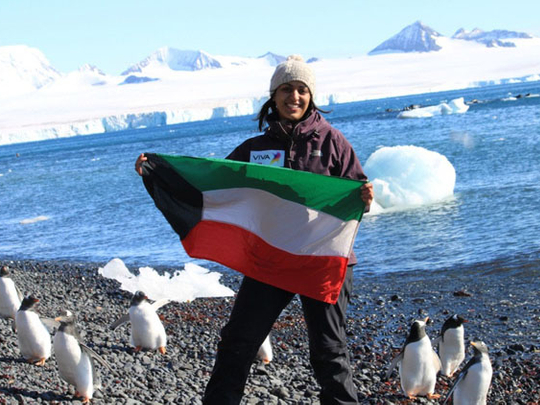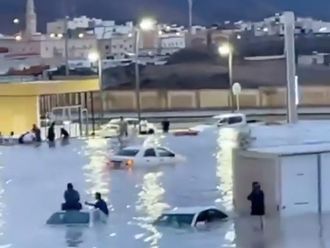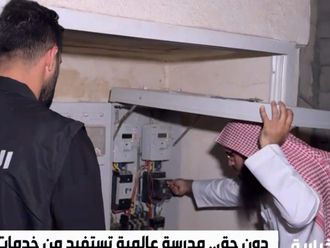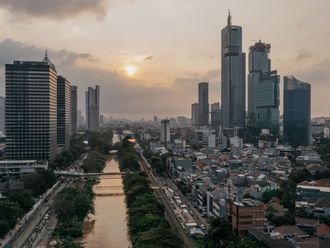
Manama: A Kuwaiti woman who has just returned home after braving Antarctica extremities is planning to go to the Arctic.
Maryam Al Joaan, an oceanographer and the first Kuwaiti woman to embark on a two-week Antarctica expedition, said that the experience had expanded her dreams and knowledge.
"People did not believe in me and thought I was unrealistic about my dreams," Maryam told reporters in Kuwait City at conference about the expedition. "I would like to tell every woman to believe in herself, show your family that you are passionate about your goal. Support will come with time. Set your goal and take one step at a time and then you will realise your dreams one day," she said, quoted by Kuwaiti daily Arab Times on Wednesday.
Maryam who represented the Kuwait Science Club on the Canadian Antarctica expedition, Students on Ice, said she did not know what to expect.
"I wasn't sure what to expect. I knew what I wanted to do and what our plan was but I didn't expect, for example, that we would encounter such a violent storm on our way back to Argentina along the Drake Passage," she said.
"Wind speed reached up to 111 km/h, and the waves reached 8-9 metre high. Literally the ship at some point was flying in the air and slamming into the waves," she said on a heart-racing point in the journey.
Expedition
The expedition took off from Germany in early February 2011, and eventually moved from Argentina to the Antarctic.
'Students on Ice' students and scientists made frequent field trips to the Antarctic mainland via Zodiac inflatables from the main ship.
These landings were supplemented by lectures, seminars and lab exercises in dedicated space aboard the expedition vessel, the M/V Ushuaia.
Approximately 70 participating university students, and 20 university faculty, scientists, experts, and educators were on the expedition from all over the world, she said.
"I embarked on the journey to understand the key role that the Southern Ocean plays in glacial-interglacial cycles in the past 2.5 million years. Understanding this mechanism will help the world understand the current climate change. The past is our key to understand our present and the future," she said.
Patriotism
A deep sense of patriotism overwhelmed her as she celebrated Kuwait's national anniversaries in the South Pole.
"It is an experience I will always be proud of having shared in a magical part of the world very few had the opportunity to witness first-hand. I got the chance to represent my beloved country Kuwait on this scientific mission to Antarctica," she said.
The expedition was also an opportunity to learn more about the Southern Ocean and its role in climate change.
"I gained more experience in fieldwork and using oceanographic measurements. Besides, I witnessed isolated wildlife such as sea birds, penguins, seals and whales," she said.
Her most memorable moments were on Paradise Bay, where "it was so beautiful and the water was so flat that you could see mirror images of the mountains and glaciers that we were surrounded with".
Speaking on the expedition's findings, Maryam said that scientists have been for the last 20 years trying to understand the correlation between CO2 and global warming and which process comes first.
"Is CO2 driving the global warming or is the global warming occurring on its own. It is like the chicken and egg dilemma. If known which comes first, then we can solve the problem of global warming," she said.
According to the Kuwaiti oceanographer, CO2 concentration correlates with rises in temperature. The more CO2 there is, the higher the temperature. Less CO2 equals ice age, she said.
"The participants collected samples from the southern ocean and have complied the data. All that is left now is to analyse the information and compare it with data gathered two years ago in order to get an overall picture," Maryam said.
"Sceptics believe global warming is not occurring. But all we have to do is look at data analysing thousands of years and we will discover that CO2 is very much correlated with temperature. The problem in this time and age, however, is that CO2 is not natural. We can tell from the isotopes in plants that the CO2 getting absorbed and released comes from fossil fuels and oil and gas," she said.
Apart from being Supervisor of the Department of Outer Space of the Astronomy & Space Sciences program at the Kuwait Science Club, Maryam is currently a trainee at the Belgian Institute for Space Aeronomy in Brussels.
Her past endeavours include taking part in a scientific expedition on board the ‘Heincke', a research ship of the Alfred Wegener Institute for Polar and Marine Research to study the impact of the Ice Age on the layers of the Earth's surface in the North Sea.
But now, she has messages and plans for young Kuwaitis.
"I plan to undertake speaking opportunities at schools and universities around Kuwait to share my experience, and encourage young Kuwaitis to proceed in the field of science and investigations. I also want to shed light on climate change and our local environmental problems. Therefore, I am organising a campaign under the slogan ‘Protect Earth, Go blue!'. It is important to protect our ocean which is the basis of life," she said.
Maryam's blog on the expedition: http://www.maryamonice.com












